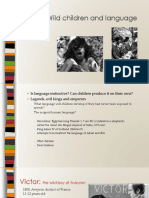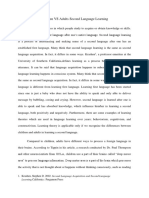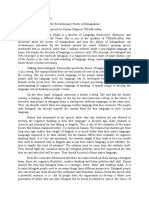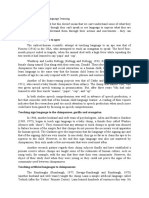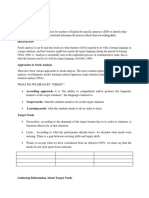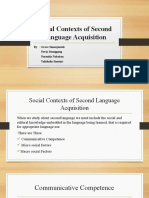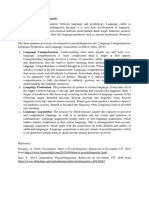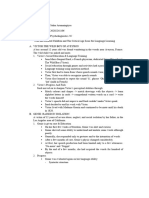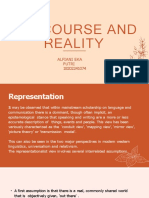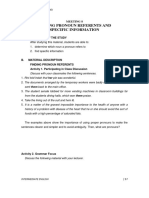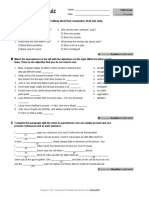100%(1)100% found this document useful (1 vote)
920 viewsTopic 3 Wild and Isolated Child and Critical Age For Language Learning
This document discusses several cases of children who were isolated from language early in life and examines what they were able to learn. It suggests there may be a critical period for acquiring language. Isabelle and Helen, who were exposed to language before age 7, learned language fully. Victor, Genie and Chelsea, exposed later, learned less. Age of exposure and trauma history affect outcomes. While a critical period for grammar exists, other language aspects like vocabulary may be learned beyond this. Conclusive evidence on a precise critical age remains elusive due to challenges finding ideal experimental situations.
Uploaded by
Guinina Nur KaesariniCopyright
© © All Rights Reserved
Available Formats
Download as PPTX, PDF, TXT or read online on Scribd
100%(1)100% found this document useful (1 vote)
920 viewsTopic 3 Wild and Isolated Child and Critical Age For Language Learning
This document discusses several cases of children who were isolated from language early in life and examines what they were able to learn. It suggests there may be a critical period for acquiring language. Isabelle and Helen, who were exposed to language before age 7, learned language fully. Victor, Genie and Chelsea, exposed later, learned less. Age of exposure and trauma history affect outcomes. While a critical period for grammar exists, other language aspects like vocabulary may be learned beyond this. Conclusive evidence on a precise critical age remains elusive due to challenges finding ideal experimental situations.
Uploaded by
Guinina Nur KaesariniCopyright
© © All Rights Reserved
Available Formats
Download as PPTX, PDF, TXT or read online on Scribd
You are on page 1/ 17
Wild and Isolated Children and the
Critical Age Issue for Language
Learning
Some Questions
Is language instinctive as natural to humans as
walking and smiling?
Without experiencing language, would children be
able to produce language on their own?
Why did only Isabelle and Helen fully learn language?
Why didn’t Victor, Genie, and Chelsea learn more than
they did?
1. Legends, Evil Kings and Emperors
a. Evil experiments
-Psamtik I, James IV of Scotland, Frederick II of
Hohenstaufen, Akbar the Great (the Mogul emperor
of India (16 century).
b. The Enlightenment and the Noble Savage
The educated people today do not believe that a
child deprived of language from birth would start
speaking the original language of humankind or any
language at all.
cont
Since ethical considerations, scientists have been on
the lookout for cases which occur naturally, so to speak
without their intervention on two things.
1) Children raised by animals
2) Children raised in isolation from language
2. Victor: The Wild Boy of Aveyron
Captured in January 1800/11-12 years old
Sicard tries but fails to educate the boy.
Itard tries teaching speech and succeeds a little.
Itard tries reading (written language) and succeeds.
Why the failure in speech.
Itard tries again at speech then gives up altogether.
3. Genie: Raised in Isolation
Genie is discovered at 13 years of age, brutally treated.
She was discovered in early 1970s in the Los Angeles
area of USA. She was 13 years old and had been locked
in a small room in her house by her father for the
preceding 12 years until her mother escaped from the
house and brought her .
cont
Genie is given freedom and care
Genie responds linguistically and socially
Rapid language understanding in one year.
Slow advance in speech production
Genie reaches a peak in language learning and the
fight for custody. Her language acquisition was
studied for about eight years.
4. Isabelle: Confinement with a mute
mother
She did not begin to learn language until she gained
her freedom at 6 and 1/2 years of age.
Isabelle’s progress: negative results at first but finally
after 20 months she can produce full length sentences.
5. Chelsea: A Tragic Case of Misdiagnosis
Misdiagnosed as retarded not deaf
After she was 32 years of age, it was revealed that she
was not totally deaf but only partially hearing-
impaired.
Language development
Through language instruction, she has developed an
extensive vocabulary and the use of language in a
variety of speech acts but she is unable to form
grammatically correct utterances and to remain on
topic.
6. Helen Keller: The Renowned Deaf and
Blind Girl (1880-1969)
Becomes deaf and blind at 19 months then secures a
teacher. She was born normal and due to illness she
became deaf and blind.
Helen learns language
CRITICAL AGE FOR FIRST-LANGUAGE
ACQUISITION
Why did only Isabelle and Helen fully learn language?
Why didn’t Victor, Genie, and Chelsea learn more than
they did?
Two major factors governing language
learning.
These two major factors relate to exposure to language
and the extent of non-linguistic trauma:
a. the age at which exposure to language began,
b. The extent of any physical, psychological, and social
trauma prior to exposure to language.
Victor Progressed more in written
language than in speech
The motor skill of speech production is more affected
by age than intellectual language ability.
Why did Genie not progress more than
she did?
Genie’s accomplishment establishes that, if there is a
critical age for acquiring the fundamentals of a first
language, i.e. grammatical structures, grammatical
rules and vocabulary.
Chelsea: Insufficient Evidence
Beyond a critical age for acquisition, syntax cannot be
learned but other aspects of language are not affected,
such as vocabulary and the proper use of language in
context, pragmatics.
The achievements of Isabelle and Helen
The language achievements of Isabelle and Helen
contrast sharply with those of Victor and Genie.
The fact that Helen exposed to language at the age of
19 months is not the only factor.
Deaf children have been known to develop their own
sign-language systems complete with rudimentary
syntax even when they have no exposure to formal sign
language (Goldin-Meadow & Mylander, 1998)
Is there a critical age for first-language
learning?
The fact that Isabelle and Helen started to learn
language at an early age.
Lenneberg (1967) have suggested the idea of biological
maturation of the brain.
If there is a critical age to learn a language it could be
younger than 6-7 years age.
The ideal experimental situation for studying the
problem of a critical age for first-language learning has
not yet presented itself.
You might also like
- Psycholiguistics and Linguistic Aspects of InterlanguageNo ratings yetPsycholiguistics and Linguistic Aspects of Interlanguage10 pages
- The Deaf AND Language: Sign, Oral, Written: Desy Catur K. Khairunnisa100% (2)The Deaf AND Language: Sign, Oral, Written: Desy Catur K. Khairunnisa40 pages
- UTS Psycolinguistic (Febry Rotama Silaban)No ratings yetUTS Psycolinguistic (Febry Rotama Silaban)4 pages
- Animals and Language Learning Psycho Linguistics)75% (4)Animals and Language Learning Psycho Linguistics)23 pages
- Teaching Across Age and Proficiency LevelsNo ratings yetTeaching Across Age and Proficiency Levels2 pages
- Comparison Between Binary and Non Binary in English and BahasaNo ratings yetComparison Between Binary and Non Binary in English and Bahasa8 pages
- The Collection of Language Assessment IndicatorsNo ratings yetThe Collection of Language Assessment Indicators16 pages
- Characteristics of Good Teacher For Young Learners100% (1)Characteristics of Good Teacher For Young Learners1 page
- Esp - Session 2 - Esp and Language SkillsNo ratings yetEsp - Session 2 - Esp and Language Skills23 pages
- Language and Culture Social Class, Taboo, and Euphemism50% (2)Language and Culture Social Class, Taboo, and Euphemism2 pages
- Theme and Rheme: From The Functional GrammarNo ratings yetTheme and Rheme: From The Functional Grammar10 pages
- Social Contexts of Second Language AcquisitionNo ratings yetSocial Contexts of Second Language Acquisition14 pages
- Makalah Language Acquisition and Language LearningNo ratings yetMakalah Language Acquisition and Language Learning8 pages
- The Commonwealth and Restoration (1649-1713) : James INo ratings yetThe Commonwealth and Restoration (1649-1713) : James I11 pages
- A. Larson (1984) B. Newmark (1988) C D. Catford (1978) : - Nida (1965)No ratings yetA. Larson (1984) B. Newmark (1988) C D. Catford (1978) : - Nida (1965)11 pages
- Material Topic Test Format Test Technique Number Item: Basic Competence Item IndicatorNo ratings yetMaterial Topic Test Format Test Technique Number Item: Basic Competence Item Indicator3 pages
- Lesson Plan On Reading (Skimming & Scanning) : Submitted ToNo ratings yetLesson Plan On Reading (Skimming & Scanning) : Submitted To7 pages
- A Word and Its Part Roots, Affixes, and Their Shapes Adriansyah75% (4)A Word and Its Part Roots, Affixes, and Their Shapes Adriansyah2 pages
- An Introduction To Psycholinguistics Week 5: Teacher: Zeineb AyachiNo ratings yetAn Introduction To Psycholinguistics Week 5: Teacher: Zeineb Ayachi16 pages
- Wild and Isolated Children and Critical Age For Language Learning SummaryNo ratings yetWild and Isolated Children and Critical Age For Language Learning Summary4 pages
- Resituating Indigenous Languages and Identities As Outlined inNo ratings yetResituating Indigenous Languages and Identities As Outlined in15 pages
- Eileen Chong Selected Poems Edited Booklet.docxNo ratings yetEileen Chong Selected Poems Edited Booklet.docx21 pages
- Tense Review 1 British English Teacher Ver2No ratings yetTense Review 1 British English Teacher Ver24 pages
- Grammar Express U50 Infinitives With Too Enough 1No ratings yetGrammar Express U50 Infinitives With Too Enough 14 pages
- Name: Muhammad Fajri NIM: L1B018077 Class: B Task 1 Put The Sentences in The Correct BoxNo ratings yetName: Muhammad Fajri NIM: L1B018077 Class: B Task 1 Put The Sentences in The Correct Box2 pages



